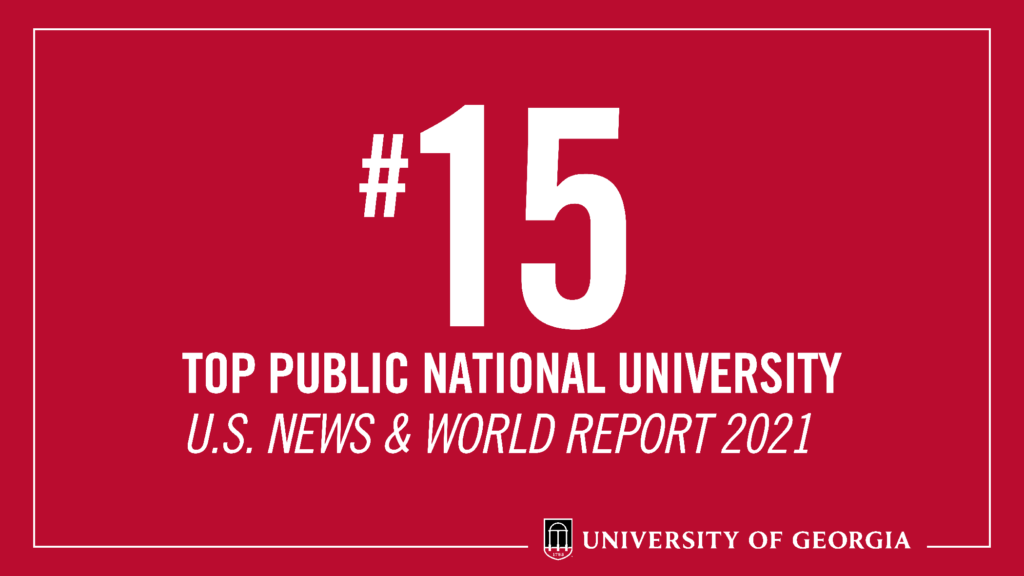Earlier this week, U.S. News & World Report announced that the University of Georgia had climbed to No. 15 in its 2021 ranking of the best public universities in the nation.
This marks the fifth consecutive year that UGA has ranked in the top 20, rising from the No. 16 position last year. Such continued success attests to the hard work of the entire UGA community, which has sparked an era of unprecedented growth and development.
 “Our sustained record of excellence is attributable to many different factors, from enrolling outstanding students to supporting our talented faculty and staff who are committed to doing excellent work,” said President Jere W. Morehead. “Other keys have been consistent support from state appropriations and alumni giving. UGA has made significant progress, and we have even greater opportunities ahead.”
“Our sustained record of excellence is attributable to many different factors, from enrolling outstanding students to supporting our talented faculty and staff who are committed to doing excellent work,” said President Jere W. Morehead. “Other keys have been consistent support from state appropriations and alumni giving. UGA has made significant progress, and we have even greater opportunities ahead.”
The powerful combination of strong resources and strategic vision is apparent. One need look no further than the impressive STEM facilities rising in the center of campus, the Science Learning Center or the Terry College’s Business Learning Community (the latter, constructed by a 50/50 public-private partnership). It is also evident in the many programs and initiatives recently developed to advance the university’s tripartite mission of teaching, research and service.
An exceptional learning environment
The university has no greater mission than to provide a world-class education and to prepare students for success after graduation.
In fall 2016, UGA introduced a new requirement for students to complete at least one academic course or activity that includes a hands-on experience, encouraging students to extend their learning beyond the classroom. Today, the university is one of the nation’s largest institutions of higher education to require that all students engage in experiential learning such as internships, study abroad, service-learning or research.
Coupled with the university’s burgeoning Innovation District—a comprehensive ecosystem connecting programs and people across campus and Athens to foster innovation and entrepreneurship—students have more opportunities now than ever before to learn the skills necessary to participate in today’s knowledge-based economy.
“I chose UGA because it has always been my dream school,” said Kamryn Corbin, who hails from Thomasville and plans to major in business management. “I knew I would have the best college experience. I also know that UGA has the best resources to give me the best education to be successful in school and after graduation.”
And UGA graduates are indeed successful. Ninety-five percent of UGA graduates are either employed or attending graduate school within six months, which is 8% higher than the national average.
The university also has put in place several programs to promote the success of faculty, staff and students from underrepresented backgrounds. For example, the J.W. Fanning Institute for Leadership Development will lead the campus community in an upcoming open dialogue on race and racism, and the Task Force on Race, Ethnicity, and Community is developing action items to help UGA create an even more welcoming and supportive environment for Black and other underrepresented students.
UGA was recently recognized with a seventh consecutive Higher Education Excellence in Diversity Award for its efforts.
Research to solve global problems
This year, UGA topped nearly $500 million in research and development expenditures, a 41% increase since fiscal year 2013.
 This growth was made possible largely through faculty hiring initiatives and through investments in more administrative support for faculty seeking external research funding. The state has also shown strong support for the creation and renovation of facilities dedicated to STEM research and instruction.
This growth was made possible largely through faculty hiring initiatives and through investments in more administrative support for faculty seeking external research funding. The state has also shown strong support for the creation and renovation of facilities dedicated to STEM research and instruction.
UGA faculty secured dozens of multi-million-dollar awards in the last year alone. One of the most prominent examples is a contract between Ted Ross and the National Institutes of Health worth up to $130 million, which Ross, a Georgia Research Alliance Eminent Scholar and director of the Center for Vaccines and Immunology in the College of Veterinary Medicine, will use to pursue a new, more advanced influenza vaccine designed to protect against multiple strains of influenza virus in a single dose.
While discoveries made in UGA laboratories are ultimately designed to improve the health and well-being of people around the world, they also have a profound impact on our economy.
The university has ranked among the top five in the nation for sending new research-based products to market for six years in a row, based on annual survey data from AUTM, a nonprofit organization that tracks technology transfer activity in higher education.
 “Much of our research is fundamental and basic in nature, and as an academic institution, that is entirely appropriate,” said David Lee, vice president for research. “But over the past two decades we have deliberately built and honed the capacity through Innovation Gateway to recognize research that has the potential for commercialization and to get it into the hands of industry partners through licensing agreements so that new products can reach the market.”
“Much of our research is fundamental and basic in nature, and as an academic institution, that is entirely appropriate,” said David Lee, vice president for research. “But over the past two decades we have deliberately built and honed the capacity through Innovation Gateway to recognize research that has the potential for commercialization and to get it into the hands of industry partners through licensing agreements so that new products can reach the market.”
Giving back
As a land-grant and sea-grant institution, the University of Georgia maintains a deep and abiding commitment to public service and outreach. The latest study to quantify the dollar value of teaching, research and service activities estimates that the university’s economic impact on the state of Georgia was $6.5 billion in 2019 alone.
In response to the COVID-19 pandemic, the UGA Small Business Development Center began offering online courses and business success training programs at no cost, and partnered with the Governor’s Office, the Georgia Department of Economic Development and the Georgia Department of Community Affairs to launch a website to help business owners navigate the application process for federal funding allocated through the Coronavirus Aid, Relief and Economic Security Act.
“During the first few months of the pandemic, our UGA Small Business Development Center consultants worked with more than 3,600 small businesses to help them get federal funding to stay afloat and keep their employees on the payroll,” said Jennifer L. Frum, vice president for Public Service and Outreach. “It’s just one of the many ways our PSO units help Georgia communities thrive and Georgians prosper.”
The 272 webinars hosted by the SBDC drew more than 13,000 participants and so far have helped small businesses across Georgia secure $88 million in grants and loans.
UGA maintains 18 regional offices across the state. Last year alone, SBDC experts helped create more than 450 businesses and nearly 3,000 jobs.
A historic capital campaign
Four years ago, UGA launched the public phase of the Commit to Georgia campaign, the most ambitious fundraising effort in university history, which was created to help remove financial barriers to students, enhance UGA’s learning environment and help researchers tackle some of society’s most pressing problems.
 The university set a goal of $1.2 billion by June 30, 2020. In total, donors gave $1.45 billion.
The university set a goal of $1.2 billion by June 30, 2020. In total, donors gave $1.45 billion.
The campaign has allowed UGA to create 3,600 new scholarships, more than doubling the amount of annual financial aid distributed by the UGA Foundation to students. Of those, 528 are endowed Georgia Commitment Scholarships, the need-based aid program launched by President Morehead in January 2017.
Private giving also has supported cutting-edge facilities for our students, helping to build Delta Hall in Washington, D.C.; the Veterinary Medicine Teaching Hospital; the Business Learning Community; the West End Zone of Sanford Stadium; the William Porter Payne and Porter Otis Payne Indoor Athletic Facility; the Alice H. Richards Children’s Garden at the State Botanical Garden of Georgia; and a variety of other projects, resulting in over 900,000 square feet of new learning and activity space.
Since the campaign’s launch, private support has also created nearly 100 endowed faculty positions, an increase of 42 percent. These positions allow UGA to attract and retain world-class faculty who can inspire generations of students and place UGA’s research enterprise among the nation’s best public universities.
An eye to the future
While these accomplishments are worthy of reflection and celebration, UGA leaders acknowledge there is no time to rest. UGA leadership has already endorsed a bold new strategic plan that will carry the university into 2025. The plan, which was developed based on input from the entire campus community, provides a roadmap to build upon the successes of the last several years and to forge new ground.
The plan is grounded in three broad and mission-centered strategic directions: promoting excellence in teaching and learning; growing research, innovation and entrepreneurship; and strengthening partnerships with communities across Georgia and around the world.


